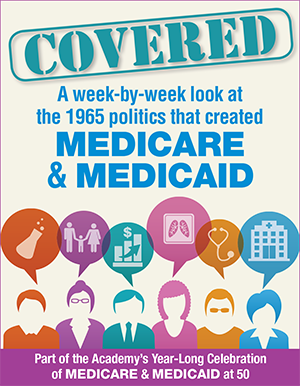Bob Rosenblatt
Throughout 2015, the Academy is working with partners to create a platform for dialogue around the history and future of these two vital programs, including this weekly Covered blog series. Covered is written by Bob Rosenblatt, a Senior Fellow at the National Academy of Social Insurance and editor of the website HelpWithAging. Learn more about the Academy’s celebration of the 50th anniversary of Medicare and Medicaid.
Nursing Home Admission Rule Stirs Discontent in Medicare Debate
By Bob Rosenblatt, Special Correspondent
July 17, 1965
Washington, DC – A three-day stay in the hospital may become the ticket that is required before a nursing home admission is covered under the Medicare bill now being negotiated by members of a House-Senate conference committee. But an unlikely political pair oppose this requirement and hopes to scrap it.
Congress should “leave it to the discretion of the doctor rather than have some bureaucratic red tape say that this patient must go to the hospital for three days,” Sidney Zagri, legislative counsel for the International Brotherhood of Teamsters, told the Senate Finance Committee in a hearing earlier in the year. A doctor should have “discretion to designate whether an individual should go to hospital in the first place or go to a nursing home or have home care,” he said.
The nursing home industry agrees. They welcome the new revenues the Medicare program is likely to generate but are deeply skeptical of government rules. William Beaumont, President Emeritus of the American Nursing Home Association told the House Ways and Means Committee in the spring that a pre-hospital admission requirement is wrong for two reasons: “First, it is uneconomic – a drain on the taxpayer dollar – and second, it is unfair to the recipient of Medicare who would be forced to use up hospital days he may need at a later time.”
But the Teamsters union is one of the nation’s most powerful labor unions and nursing home operators are in every congressional district. Both groups want doctors to be able to refer patients directly to a nursing home, instead of having a three-day hospital stay linked to admissions.
The Johnson Administration, worried about the cost of the program, is trying to block major changes to the nursing home provisions of the House or Senate bills that would run up expenditures. Both bills currently require a three-day stay before covering nursing home care. Such a requirement becomes a block against what Administration planners fear could be excessive, costly use of nursing homes.
The non-profit segment of the industry, which also dislikes the three-day hospital stay requirement, has suggested a compromise: a committee of doctors that could review the health records of prospective nursing home patients and decide on admissions, according to Carl E. Becker, MD, president of the Wisconsin Nursing Home Assocation and a Lutheran minister. The Lutheran church owns and runs more than 200 nursing homes.
The issue of the three-day requirement is being raised in the conference committee only because the House and Senate bills have slightly different nursing home benefits. The House bill provides 20 days of care, with two additional days for each unused hospital day, up to a maximum of 100 days. The Senate bill provides 100 days, with a $5 co-payment for each day over 20. Both bills require a three-day hospital stay before a nursing home stay is covered.
The focus of the Medicare legislation has been on acute illness confronting older Americans, but people over 65 are more likely than younger people to develop chronic illnesses that require more than just a quick hospital stay. While convalescent care has always been part of the Medicare plan drawn up by Administration, supporters of the legislation have also sought to limit the program’s fiscal impact. They want people to be able to receive convalescent help that is carefully targeted.
The Administration and its allies in Congress have successfully conditioned access to nursing home care in the individual House and Senate Medicare bills. They hope their view will prevail in the final version of Medicare produced by the conference committee, but discussions continue, and there are many moving parts to the program and many trade-offs to be made. “I still believe that it is wrong to require that nursing home care must be preceded by a stay in the hospital…” Sen. Leverett Saltonstall (R-MA) observed.
► Directory of COVERED posts
► See the next post in the COVERED series, “Medicare Conferees Tackle Last Hurdle and Referee Fight Among Docs”
► Learn more about the Academy’s celebration of the 50th anniversary of the enactment of Medicare and Medicaid

